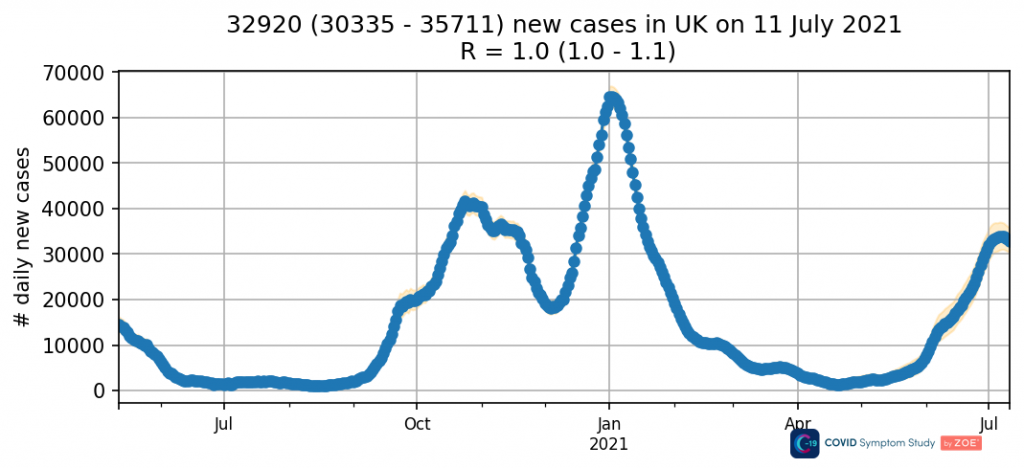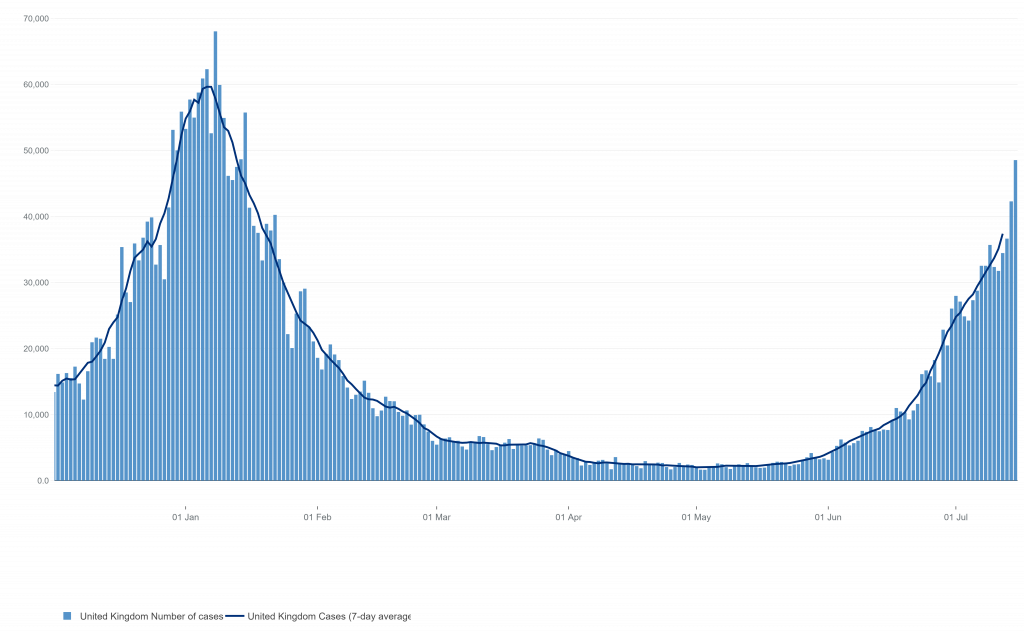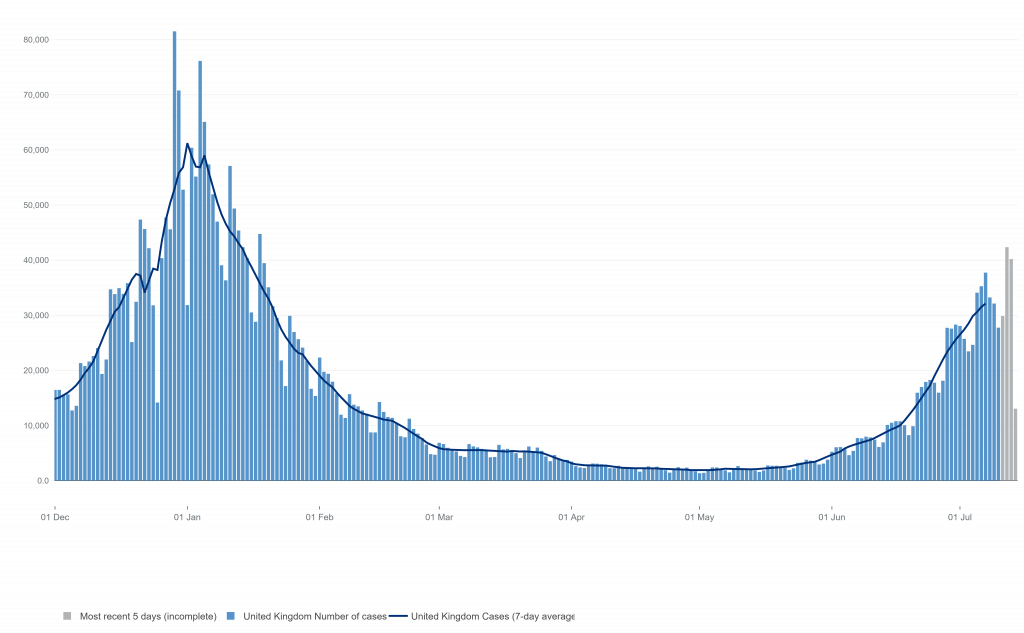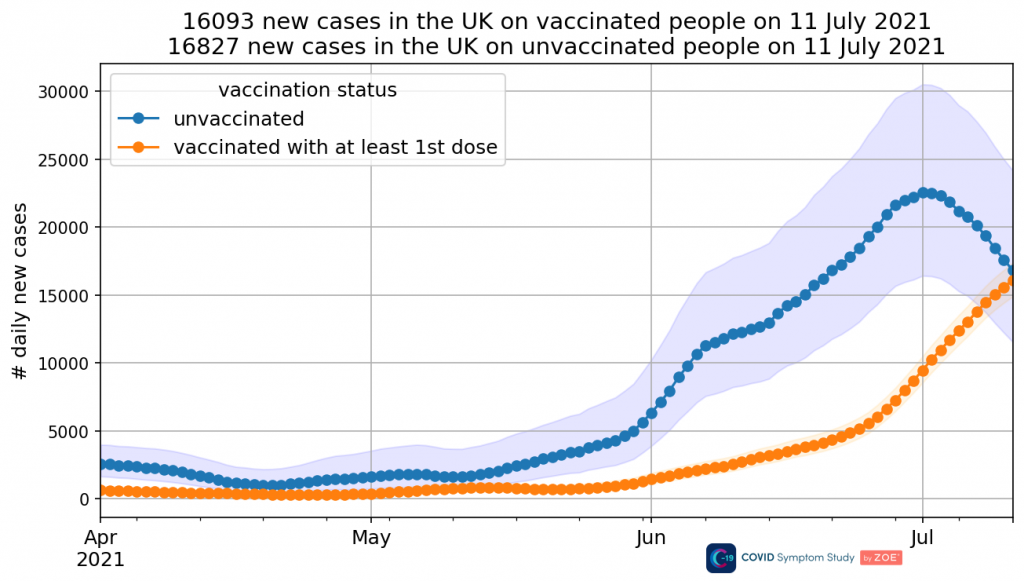Reported positive Covid tests hit a new recent high yesterday of 48,553, confirming for many that their fears of a big exit wave are coming to pass.
However, Tim Spector, lead scientist on the ZOE Covid Study app and Professor of Genetic Epidemiology at King’s College London, had another message: according to his data, infections are already peaking.

ZOE data for July 11th (data from the app is always four days behind) showed 32,920 symptomatic infections in the U.K., and this appears to have peaked (R is currently estimated to be around 1) and may already be starting to drop (see above).
Why is this so different to the new daily ‘cases’ reported by the Government, which show no obvious sign of peaking?

One possibility is that the ZOE data is a false dawn and the rise in reported infection numbers in the last four days will come through on ZOE in the coming days. However, the Government dashboard is already showing new infections declining in Scotland, suggesting the nationwide peak may be near.
Another possibility is it may be an artefact of the reporting delay. If we look at ‘case’ numbers by specimen date (below) then there seems to be more evidence of slowing towards a peak.

ZOE data provides a breakdown by vaccination status, which shows symptomatic infections in the unvaccinated have been dropping since the start of the month, whereas those in the vaccinated (with at least one dose) continue to surge – though are perhaps slowing towards a peak now.

Professor Spector notes that “new cases in vaccinated people are still going up and will soon outpace unvaccinated cases”. He suggests this is “probably because we’re running out of unvaccinated susceptible people to infect as more and more people get the vaccine”. Another way of putting this is that the unvaccinated are nearing herd immunity.
Oddly, Professor Spector shows no obvious interest in exploring further the implications of his observation. In particular, if the vaccinated are surging while the unvaccinated are dropping, how can either trend be attributed to the restrictions? Clearly the restrictions are not preventing spread, and the drop is a result of reaching herd immunity (as Tim effectively acknowledges). The unvaccinated population has seen this plunge before, of course, both in December and March 2020, so this is not a new thing. It seems to suggest that herd immunity has been reached on two previous occasions and this is more of a topping up, presumably due to the partial immune evasion of the Delta variant.
Prof Spector emphasises that “whilst the figures look worrying… vaccines have massively reduced severe infections and post-vaccination Covid is a much milder disease for most people”.
“The main concern is now the risk of Long Covid”, he says – as though that could possibly justify all the social restrictions, travel constraints, enforced vaccinations and so on that will still be with us after ‘Freedom Day’.
With Chief Medical Officer Chris Whitty warning yesterday that restrictions could return as soon as next month, at Lockdown Sceptics we’ll be keeping a close eye on the data.











To join in with the discussion please make a donation to The Daily Sceptic.
Profanity and abuse will be removed and may lead to a permanent ban.
Say what you like about GB News, Neil Oliver is fantastic and a hero. And this is well worth a listen (monologue starts 6:49).
Neil Oliver | Saturday 4th March – YouTube
Note also the comparison of a “covid” enquiry to the Hillsborough enquiry (which I have made previously) by Ceri Dingle at 19:13. I like to think that these criminals will be pursued as long as it takes, the same as Hillsborough, and the same as the war criminals of WWII.
The BBC and the Times muppets – here’s what their journalist Oliver Wright writes for them these days:
Articles by Oliver Wright’s Profile | The Times Journalist | Muck Rack
And here’s what he wrote about for the Independent back in 2014 (refresh page to show full article?):
Big Pharma lobbyists exploit patients and doctors | The Independent | The Independent
Revealed: Big Pharma’s hidden links to NHS policy, with senior MPs saying medical industry uses ‘wealth to influence government’ | The Independent | The Independent
And there’s no sign of any other journalist of the Times muppets stepping into the breach that I’ve seen. And I make no apologies for reminding any Times muppet who may be reading that they are out and out anti-truthers (and for calling on anyone who may be in a position to do so (including Toby Young) to call out the Times muppets on this after their disgraceful slur against readers of this site).
NB I note the link above (Muck Rack) describes Oliver Wright as policy editor (for the Times muppets), so I assume he has been bought and paid for. I also assume he has sold out.
Just for fun, taking you back to 1965:
puff the magic dragon at DuckDuckGo
And good morning one and all. Thanks to everyone opposing the tyranny. Stay strong, stay free!
The SAGE crew ! What a shower ! Anyway I thought this covid virus wasn’t as dangerous as the measures taken against it ! Why then the panic over the next possible outbreak (Gates has promised one ) Could it be to give all power to the WHO where their pals Michie & Farrar are busy getting a things organised
Nick Triggle stood out – one BBC reporter who, sure, went with the mainstream narrative pretty much, but it was noticeable that he was trying hard to present a balanced, calm view of things – I suspect he was one of the 5% with their eyes open. He didn’t fear-monger.
“YouGov poll reveals public still thinks Government didn’t lock down hard enough”
I find these figures shocking but understandable. Younger people especially have been taught that government is a safety blanket in which they should be wrapped up nice and warm, with more money, more money and more money provided to them and their causes. The generation who wanted them the government to keep out of their lives and do as their voted manifesto are long gone, sorry to say.
Those polls are an absolute insult to our intelligence. They’re taking the pish and not being subtle about it. Desperate idiots.
Sadly hardly anyone I know in real life is a Covid sceptic, so I find these results quite plausible.
But you have to ask yourself which type of people are taking part in these polls. I genuinely don’t know how it works. Is it that a certain personality type signs up for email notifications whenever there’s a new poll survey to complete? Are these people seeking out the website regularly in order to fill in these questions? Are these people more likely to be the ‘lap top’ class, who have the luxury of earning a living from anywhere, sat in their PJs at home, type of person? Because I’m not at all convinced that the people completing these surveys reflect a cross section of the public, and especially not working class people who have to leave the home in order to go earn their wages. It’s pure manipulation and totally inaccurate in my opinion, until somebody proves otherwise.
Well, I’m on YouGov, mainly in a vain attempt to counteract the kind of people you’re referring to. I expect some of the results are manipulated to produce the answer people are looking for, and the questions are often leading, and I am sure that little effort has gone into making sure the sample is representative. My personal sample is not representative either, but nevertheless I know hardly any covid sceptics in real life. Only 6 people I know in real life are definitely unvaxxed, and that includes me and my Mrs. A couple more are vaxxed but regret it and are definitely now red pilled. The rest were covidians and have not repented, at least not to me.
Survey says there were a mere 3181 people filled the poll in. I mean, c’mon! What in the world is that meant to represent?? It’s a joke! What I’m really trying to ascertain is, are the vast majority who fill in these useless things the Guardian reader/BBC watcher/Covidian/Narrative-following, masktard, jab-junkie sort? LOL….And peeps such as your good self are outnumbered by a country mile. I know what I believe anyway…
I know what I believe anyway…
I don’t think the number of people surveyed is necessarily a problem provided they are representative.
I know a lot of older people who certainly don’t read the Guardian – dyed in the wool lifelong Tories – who completely bought into the Covid narrative
I don’t know a single person who I know is unjabbed and I’ve never heard anybody express any scepticism of the fundamentals of lockdown or jabbing.
My ex thinks I’m just being awkward because I enjoy confrontation and even then often forgets which side I’m on!
Hi Mogwai.I worked for a few months doing Market research for Mori .
We had a general topics survey most weeks which would have covered this sort of question.The survey areas typically 250 addresses ,as we were door to door , covered a wide range of housing types ,and we had to meet a mix of ages and sex for the interviewee that made the sample representative .If the survey is being conducted according to the Market research Society guidelines and is not self selective then it should be pretty accurate .
Yougov polls are worthless in my opinion – Zahawi.
Correct. Merely a tool of desperation, designed to attempt to keep the PsyOp going and the sheeple herded in the required direction at all costs. It’s beyond pathetic isn’t it? In a way the DS team aren’t doing us any favours by publishing this meaningless, superfluous bilge.
The questions are phrased in such a way as to be anything but unbiased. I’d have failed the research module of my course if I’d run with such a dire set of questions.
I have been told that in UK universities barely anyone is sceptiocal about Covid or MMGW. Those who are doubtful about the government’s line dare not speak out for fear of their careers and peacable work life. Seems in US universities there is a greater range of opinions but it was a relatively conservative university.
UK schools the same. Teachers dare not disclose even what other members of their family believe, so intolerant have they become. We can imagine what the kids get taught. On which subject and by the way, why does Essex CC still fund an Anglo-European school; when I last visited it was obviously a brain washing centre fior Rejoiners. A former pupil told me as much.
What will the next pandemic be? We asked the experts – and their answers will terrify you…
Flu, a different type of coronavirus, superbugs and STIs were named candidates
Read more: China reports TWO human cases of bird flu amid fears of outbreak
By JOHN ELY SENIOR HEALTH REPORTER FOR MAILONLINE
pandemics of so called experts
*****
Stand in the Park Make friends & keep sane
Sundays 10.30am to 11.30am
Elms Field
near Everyman Cinema & play area
Wokingham RG40 2FE
Hancock this, Hancock that – what a crock. The entire cabinet, opposition, establishment, parliament, institutions, in almost every rich world country were in lockstep and a good part of the public were cheerleading them on.
It’s not about Hancock.
It’s using fictitious asymptomatic spread as an excuse that the failure to stop the ‘virus’ was due to insufficient fraudulent testing….
All a cover-up for the real crimes of trashing of human rights, NG163 murder protocol, destruction of small businesses, lack of early treatment & the bioweapon injection is the only magic bullet to save the day.
YouGov: Nadhim Zahawi’s Government Policy-justifying “polls.” As believable as the Tooth Fairy.
https://www.dailymail.co.uk/columnists/article-11821031/PETER-HITCHENS-know-sure-leaders-lost-heads-Covid.html
Peter Hitchens shame test – any MP standing at the next election who supported the covid hysteria should be disqualified. This needs to be broadened – any MP who failed to speak out against the covid hysteria should be disqualified.
Hitchens has clearly fallen for the Whatsapp “limited hangout” (stupid term: ” limited admission” would make much more sense).
But then he was thick enough to get jabbed.
Shocking post-Covid jab increase in miscarriages and stillbirths
FROM LifeSite News again, a preprint study examining government data has found that, in comparison to the influenza vaccine, the Covid-19 gene-based inoculations produce a 57-fold increase in miscarriages, a 38-fold increase in stillbirth rates, and a 1,200-fold increase in menstrual abnormalities.
Dr James Thorp, a board-certified obstetrician/gynaecologist, appeared on the Tucker Carlson Show on Thursday to discuss the paper he co-authored and expects will soon be ‘the lead featured article in a major peer-reviewed medical journal.’ We will reporting on this and on UK and EU data ourselves in the coming days
From an excellent round-up at TCW.
This may be of interest to Deborah T.
And here is the full round up from TCW:
https://www.conservativewoman.co.uk/in-case-you-missed-this-4/
https://www.conservativewoman.co.uk/exclusive-the-gray-starmer-files/
A delightful, comedic short spin on the Sue Gray recruitment by Kneel.
Well, we all need a little cheering up occasionally.


Shouldn’t we all take a moment to thank the NHS for bringing the Sunday Times Insights Team out of their 3 years long medically induced coma? Something of a medical miracle!
“What will the next pandemic be?”
Depends what WEF and WHO chose it to be!
We’ve discussed the trans issues in relation to women’s prisons, school toilets, single sex spaces & age appropriate entertainment. This grooming (which to me with my child protection training screams it out to be) is just beyond horrific. The fact that it remains uncensored on the internet also raises a huge red flag for me.
Child protection should be at the forefront of our minds & actions.
I’m all for free speech but this is grooming in preparation for abuse & it is already covered by existing laws.
https://twitter.com/hatpinwoman/status/1627307254650134528?s=21
Here is Isabel Oakeshott sticking it to another fake journalist. It may be all a show to distract from injection harms, but my word, it is entertaining: –
https://www.youtube.com/watch?v=oZLYTWiA_fE